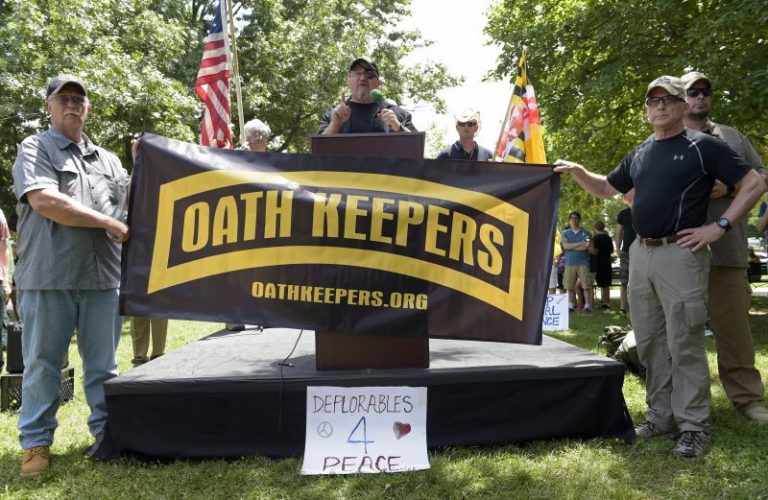A federal judge on Friday sentenced a Jan. 6 “operations coordinator” for Oath Keepers founder Stewart Rhodes to two years’ probation and 60 hours of community service, rejecting federal prosecutors’ requests for prison time.
Michael Greene, 40, of Indianapolis, was a paid contractor known as “Whip” who helped the extremist group run security details for Republican VIPs at events leading up to and including the pro-Donald Trump rally before the Jan. 6, 2021, attack on the Capitol.
Greene, who did not enter the Capitol, was convicted at trial in May on one count of trespassing on restricted grounds. Greene’s defense argued he was not a core follower, and a jury acquitted him of three felony counts, including conspiring with Rhodes and others and tampering with evidence. A judge declared a mistrial on a fifth count after a jury hung on a charge of conspiring to obstruct an official proceeding.
“The jury did not find Mr. Greene guilty of the most serious offenses with which he was charged,” U.S. District Judge Amit P. Mehta said. “That was their verdict, and we have to respect that, just as we ask the public to accept the guilty verdicts of others.”
No Capitol riot defendant convicted of a misdemeanor who did not enter the building has been sentenced to jail, he said.
“I’m not an Oath Keeper. I took a job,” Greene said when it was his turn to address the court.
Greene, a Black former police officer and Army veteran of the Persian Gulf War, added that he has tried to serve as a role model for young people and that jailing him would tell them “you can do everything right” and still be punished by the justice system. “The only thing I’m guilty of is working for an organization of White folks that high-end White folks consider to be unfavorable White folks,” he said.
Assistant U.S. Attorney Kathryn Rakoczy called the sentence wrong and “patently unfair” to other Oath Keepers defendants sentenced to prison after they cooperated with the government and said that it would not deter future threats to democracy.
Rakoczy said that Greene played a leadership role for at least 19 members and affiliates who did breach the building and induced others to join the “powder keg” of the riot. Asking Mehta to sentence Greene to a maximum misdemeanor penalty of one year in jail, Rakoczy said the defendant spoke by phone with men at the front of two groups just before they entered the building; texted “We’re storming the Capitol”; and photographed the entrance used.
Mehta said that the government’s circumstantial evidence, however serious, remained “suspicions, hypotheticals and speculative.” He noted that Rhodes asked Greene to take over security details only days before Jan. 6 because another member got sick and that Greene revealed almost nothing about his beliefs or intentions in group chats, because he did not send them or was not invited to them.
Nine Oath Keepers have pleaded guilty to or been convicted of seditious conspiracy or opposing federal authority by force. Rhodes and a top lieutenant, Kelly Meggs, have been sentenced to 18 and 12 years in prison, and most of the others to three to 10 years, after the main group staged a small arsenal of firearms in Northern Virginia and entered the Capitol together in military-style gear.
Defense attorney William Shipley accused the government of repeating a “fantasy” rejected by a jury, concocted because it sought to charge Greene in an unsuccessful effort to keep him from testifying against others.
Shipley said his client has no prior criminal history, served his country honorably, has been a federal-agency-approved security contractor and would like to have lifted a court prohibition on his possession of legally registered firearms at home so he can make a living while on probation. “There is no justification for any term of imprisonment for — as Mr. Greene testified — remaining outside the Capitol and taking pictures of a spectacle not likely to ever happen again in his lifetime,” Shipley said.

